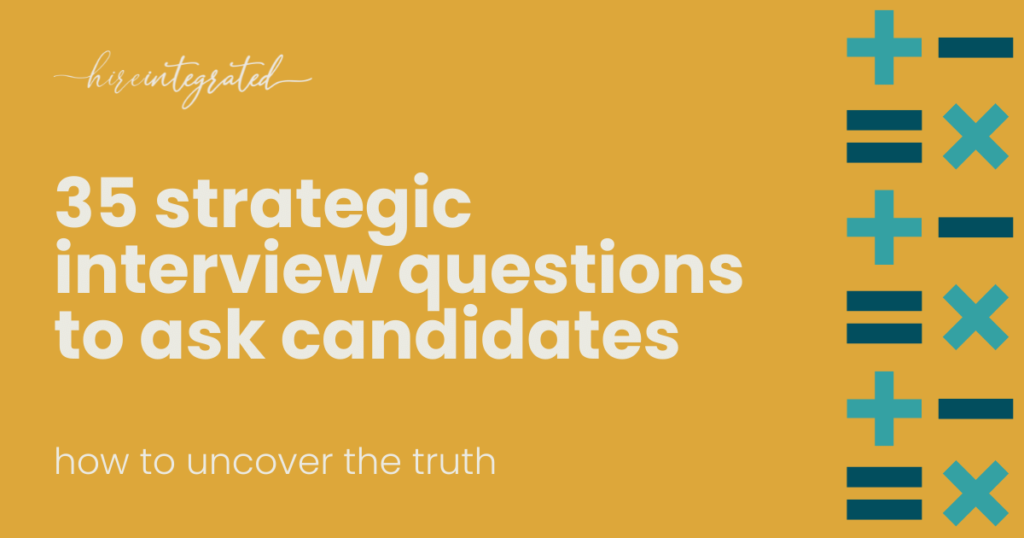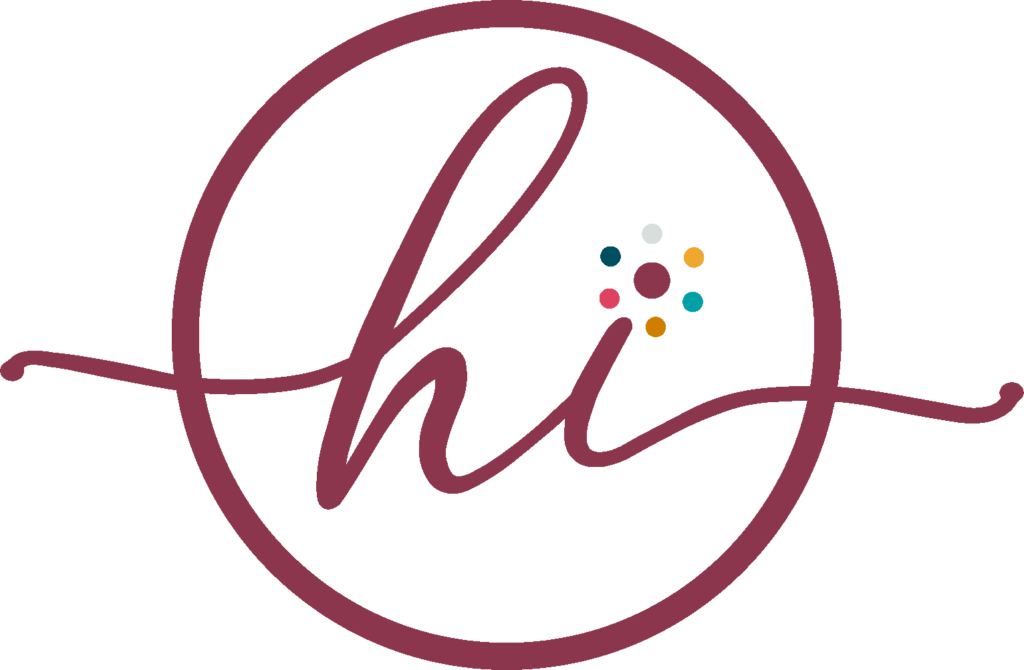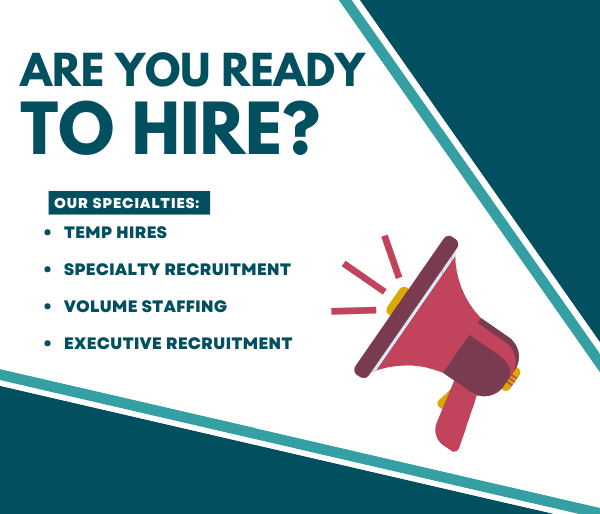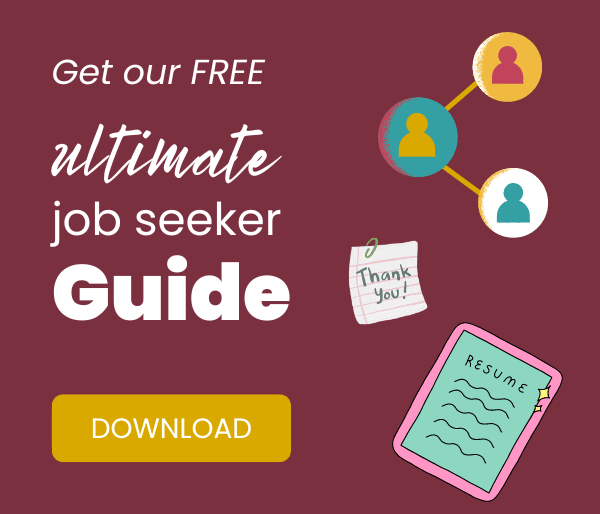Last Updated on September 20, 2024
As an interviewer, you must to be asking the right questions to get to the information you need to properly assess a candidate. While becoming a great interviewer takes practice, a crucial base is to have an expert-crafted set of strategic interview questions to ask candidates.
Are you in need of strategic interview questions to ask candidates for a job that you are hiring for? Here are 35 of the best questions that you can ask along with an explanation about what these questions uncover regarding a candidate.

Strategic Interview Questions to Ask Candidates
1. Can you teach me something in 5 minutes?
Candidates must be able to communicate clearly. Putting an interviewee on the spot forces them to think on their feet and reveal their ability to simplify complex issues in their communication. Being a great teacher is one of the most difficult skills, so if you find someone who nails this question then that is a huge plus in their favor.
2. What are your goals for yourself this year?
It’s critical to find employees who set goals for themselves. This question reveals a candidate’s motivations. It is valuable to have a good understanding of what pushes a candidate, since they will eventually be your employee that you will need to motivate. Finding the answer to this question also can help you assess whether or not their motivations match up with the goals of your company.
3. What motivates you?
If you want to get straight to the point regarding the underlying incentives of a candidate, ask what motivates them. Motivations are great at revealing more about who a job applicant is under the surface.
4. How would you describe your ideal boss?
Since you know your organization, the answer to this question can decide whether or not the candidate would be a good fit with your team. Employees thrive in different environments. Use this question to ensure that a job applicant would be successful in your workplace.
5. What is your greatest achievement?
You should know what the candidate is proud of in their career. This question gives the candidate a platform to talk about the great things they have done in their life. A candidate’s personality can really shine through in this question. It can be a great way to get to know a job applicant better and get them to open up.

6. How do you deal with deadlines?
Depending on the job, this question can carry different weight. For high stakes jobs with hard deadlines, you need to know that a candidate is able to work under serious pressure. However, every job experiences pressure to some degree. You need to understand if a candidate is able to respond appropriately to deadlines.
7. What do you like about your current job?
This reveals the candidate’s ability to see the positive in a situation. Seeking for employees who embody positive attributes can be remarkably beneficial to your company culture.
This question also shows how satisfied they are with their profession. If an employee is dissatisfied with their work, their performance will likely suffer. This question allows you to gauge their likelihood of struggling with burnout or decreased performance over time.
8. Describe a time when you have disagreed with your boss
While this might not always uncover much, this question could help give you a better glimpse at the character of a candidate. How does the applicant respond to conflict with people of authority? Understanding how a candidate has acted in tough situations is very indicative of how they will act when faced with problems in the future.
9. What is your ideal culture for a workplace?
Every organization has a unique environment and culture. In the same way, employees have unique requirements for the culture of the business they work for. You should use this question to assess whether the applicant would be successful in your company culture.
10. Is there a skill you wish you had?
This question has a number of benefits. For one, it can unveil more about a candidate’s personality. It also gives an applicant the chance to talk about what skills they already have and have developed. Beyond this, it can also reveal potential weaknesses.

11. Describe a time when you had a conflict at work. What did you do about it?
Asking questions surrounding problem solving are crucial to understanding the type of employee someone is and how they think. Can they withstand pressure, overcome problems, and use creativity in overcoming obstacles? This question reveals a good deal surrounding the way a candidate approaches and conquers problems.
12. Tell us about our company
Statistics show that nearly 50% of hiring managers will reject job candidates if they do not know enough about the company. This question is a great way to test if your candidate did their research on your business. Ask them to talk about what they know about your company and they will reveal fairly quickly whether they did their homework. If they didn’t research your company, that could be indicative that they are not truly interested in the position.
13. Why do you want to work at our company?
There are few questions better than this to determine someone’s passion for the job. You will be able to gather a strong understanding of what this person knows about the company and how interested they are in the position.
14. Do you have Any questions?
A great candidate is a curious one. Asking questions shows that they are truly interested in the job. Ask this question at the conclusion of your interview. Keep things open ended to allow the candidate to get the answers to the questions they are wondering about.
Look for candidates who have passion that comes through in their questions. Asking an interviewee if they have questions is an excellent way to test their interest in the position. If they have no questions, then they likely have not been listening, didn’t research enough, or don’t have enough interest to gather more information.
15. What are your strengths?
This question indicates the candidate’s ability to self-evaluate and recognize what they are good at. A good candidate is one that is able to properly access where their strengths and capabilities lay.

16. What are your weaknesses?
Having a candidate that is able to recognize their weaknesses is crucial. Nobody wants to work with someone who thinks they are perfect. Look for candidates who are able to identify their own shortcomings and show how they are trying to overcome them.
17. How would your past co-workers describe you?
This can be a way to gauge how well a candidate can assess themself from an outsider perspective. This could garner a different answer than asking about strengths and weaknesses, since you will get more of an insight on the personality of the candidate.
18. Tell me something about yourself that isn’t on your resume
As much as you want to know about their work experience and skills, you should also take some time to get to know your candidate beyond their career. This question is beneficial to find out if someone will mesh well with your team.
19. When working on a group project, what role do you usually fill?
This is revealing to their personality more than anything else. If you are hiring for a manager role and someone says that they are more of a follower, that could be a cause for concern. Make sure that the candidates answer to this question lines up with what your organization is in need of.
20. Why are you leaving your current job?
While it may sound nosy, it is beneficial to have an understanding of why a candidate is interested in finding a new job. If they are likely to encounter something that caused them to want to leave their last job in your business, then it might be better to pass on this candidate. Use this question to make sure you get someone who is in it for the long haul.
21. Describe a time you’ve had to overcome a challenge. What was the challenge and what did you do?
Just like so many of the other problem-solving questions, this question allows you to understand the way someone thinks to see if it is compatible with your company. When faced with a difficult circumstance, what approach do they take? Use their answers to find if their methods for solving problems matches up with the needs of your team.

22. Explain a time that you used creativity to solve a problem
Depending on the role, creativity can play a significant part in the success of an employee. Use this question to assess how a candidate can think outside of the box in order to problem solve.
23. How would you deal with an upset customer/client?
While this question won’t be appropriate for every position, it can be very beneficial for client-facing roles. In these positions, you need to know that your candidate is able to hold up under pressure and help a client through an issue they are facing.
24. What do you predict will be the new challenges that will face our industry?
You want an employee who is insightful, understands industry trends, and can easily communicate their expertise. The candidate’s answer to this could show how deep their understanding of your industry is.
25. What’s the most interesting project that you have worked on? Why did you like it?
More than anything else, this question can reveal a candidate’s personality and their passion for the job. If they love what they do, it will shine through in this question. If you get someone talking about things that they love, they quickly open up and you can see more of what makes them tick.
26. Describe a time you failed to meet a goal. What happened?
You need employees who can respond to failure. Understanding a way an employee thinks and works when they encounter failure is important to being able to help them. Your candidate should always show an ability to bounce back from failure.
27. If you were to start your career over, what would you change?
Reflection is a powerful practice. It helps to identify ways to improve and change. If your candidate has a solid answer prepared, then it shows that they regularly self-assess and are able to identify places they need to improve.
28. What is your method for learning a new skill?
This question is fundamental in an interview if your position requires learning new skills regularly or involves any on-the-job learning. Diving into their methods for learning new skills is beneficial to understanding how much of a self-starter they are.

29. What is your approach to workplace conflict?
While not everyone will have experience with workplace conflict, this question can uncover any past experiences that might need to be discussed in your interview. Beyond this, having employees with practical problem-solving skills are crucial to any team. Ensure that the way that a candidate solves problems is compatible with your team.
30. How do you deal with failure?
Knowing how someone bounces back from failure is crucial. Those that have the ability to rebound quickly from mistakes and errors are the best people to have on your team. Look for candidates who can answer this question with real life examples.
31. What piece of critical feedback do you receive most often?
If they are honest, this can be extremely beneficial when discovering any concerns with the candidate. It can also show how they have worked to overcome mistakes, weaknesses, or problems they experienced in the past.
32. Who inspires you?
Similar to the questions regarding motivations, this question exposes what drives a candidate. This can be very revealing regarding their core motivations behind their actions. Use this question to further get to know a candidate, see some vulnerability, and find if their motivations match your organization.
33. How could your current company be more successful?
Asking about how they could improve the success and results at their current or past employer is a great method for identifying the candidate’s ability to identify issues and solutions. Every boss wants an employee who can both recognize and resolve problems that will arise for their business.
34. If you are behind schedule and someone asks for your help, how do you respond?
This shows what a candidate’s priorities are when they are in a stressful situation. Do they look to solve their own problems first and then someone else’s?
While there might not be a universal right answer to this question, as an employer you need to identify what you value the most. This question could be very revealing as to how this person would be as a colleague.
35. What was the color of the receptionist’s shirt?
This question sounds rather silly, but you’d be surprised by how many employers regard this as a valuable interview question. Why? It shows attention to detail, even under pressure. Often, interviewees are so nervous for their interview that their observational skills go out of the window. This question shows how observant you are and how you manage pressure.
Last Thoughts
As you read over this list, hopefully you found some questions that might be beneficial to your interviews. Be sure that you have a strategy and reason behind each question that you ask during an interview. This will help you understand the value behind each answer and properly evaluate candidates against one another.
Remember, having the right strategic interview questions to ask candidates will make all the difference as you look for the best future employee!
Need more career advice? Check out the Hire Integrated blog.

Emily Rushton, Founder and CEO of Hire Integrated, has over a decade of experience in recruitment, helping companies solve high-volume hiring challenges. Her unique, storytelling approach has made her a trusted leader in the industry, helping both businesses and candidates succeed.









